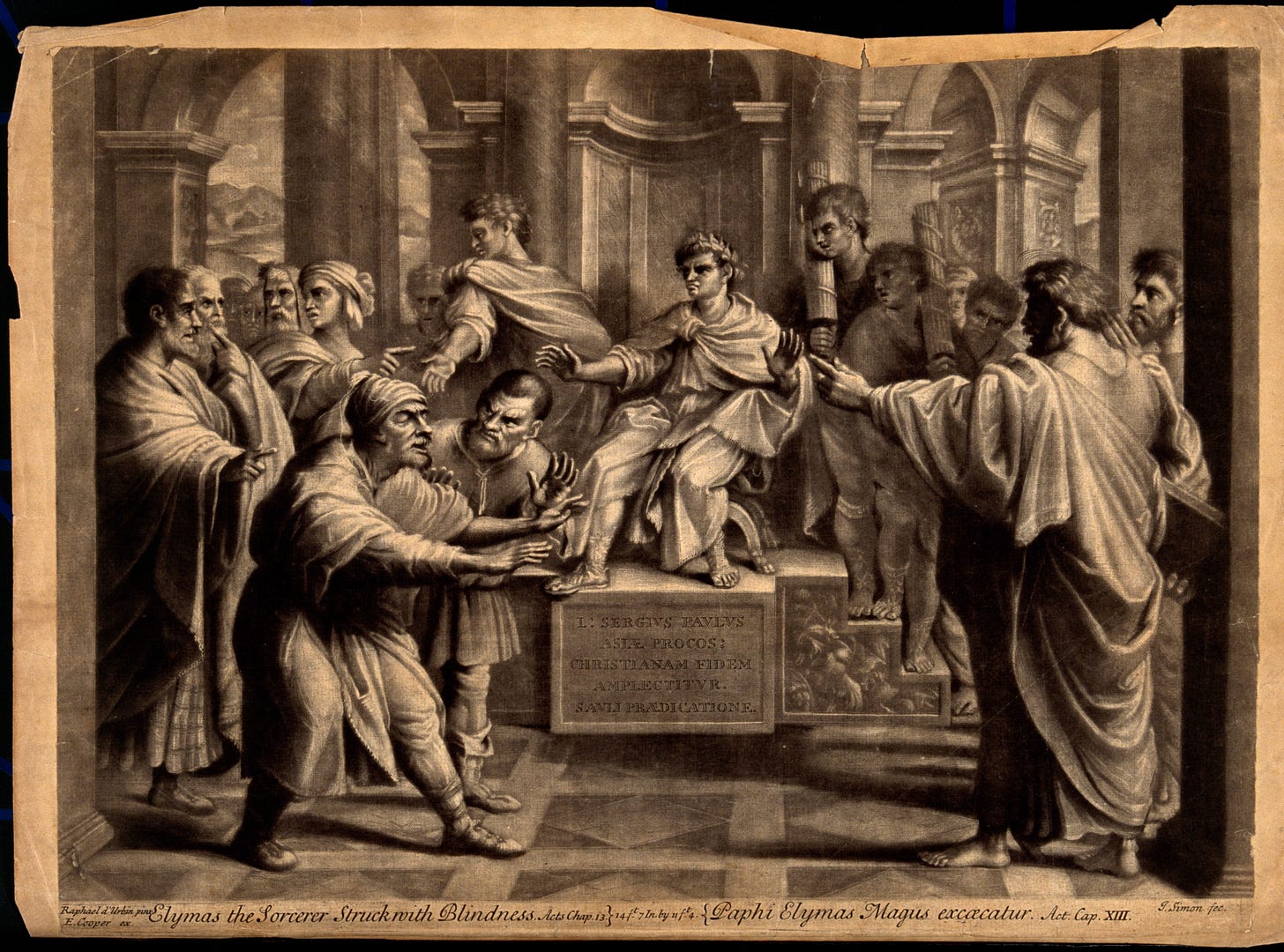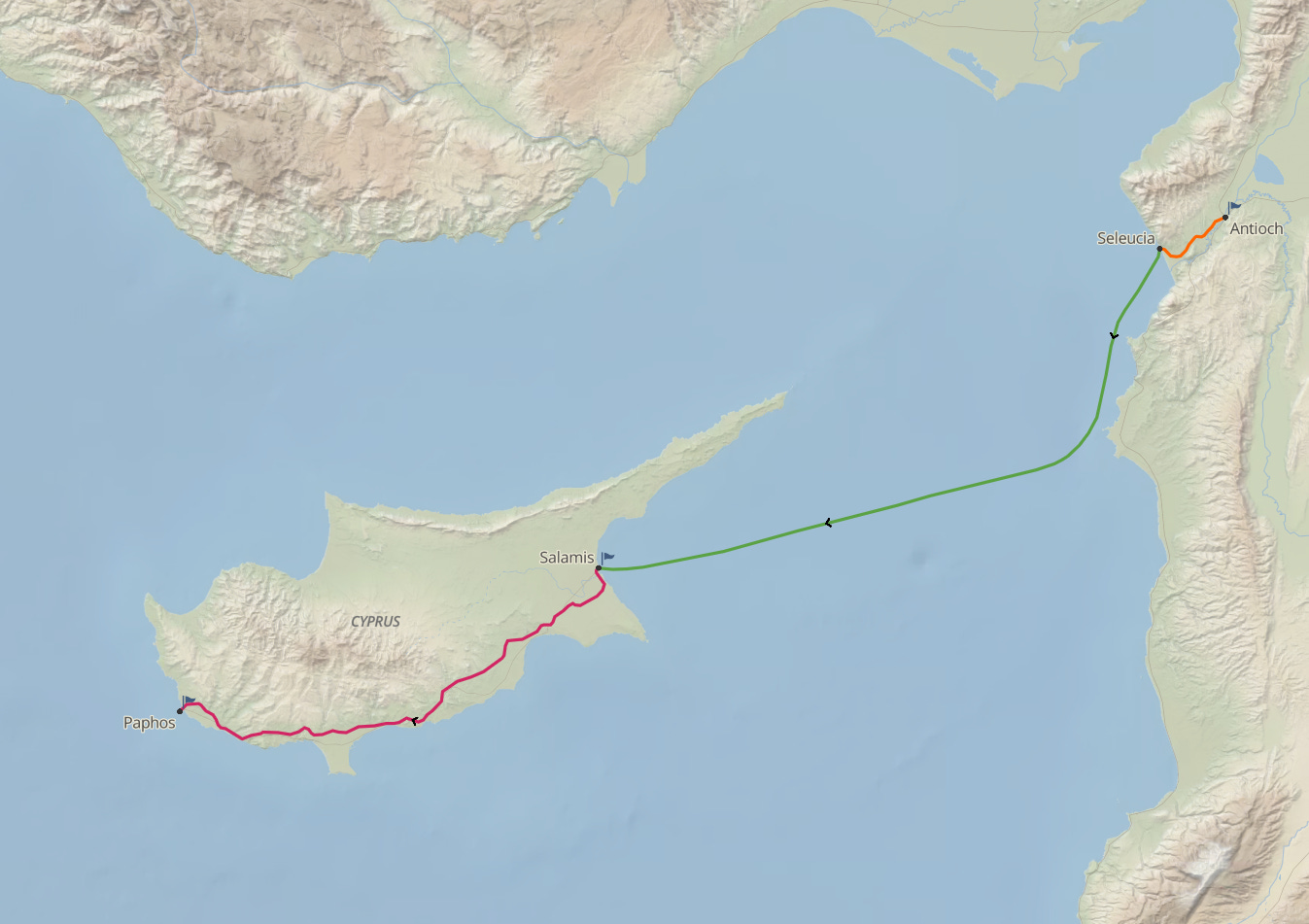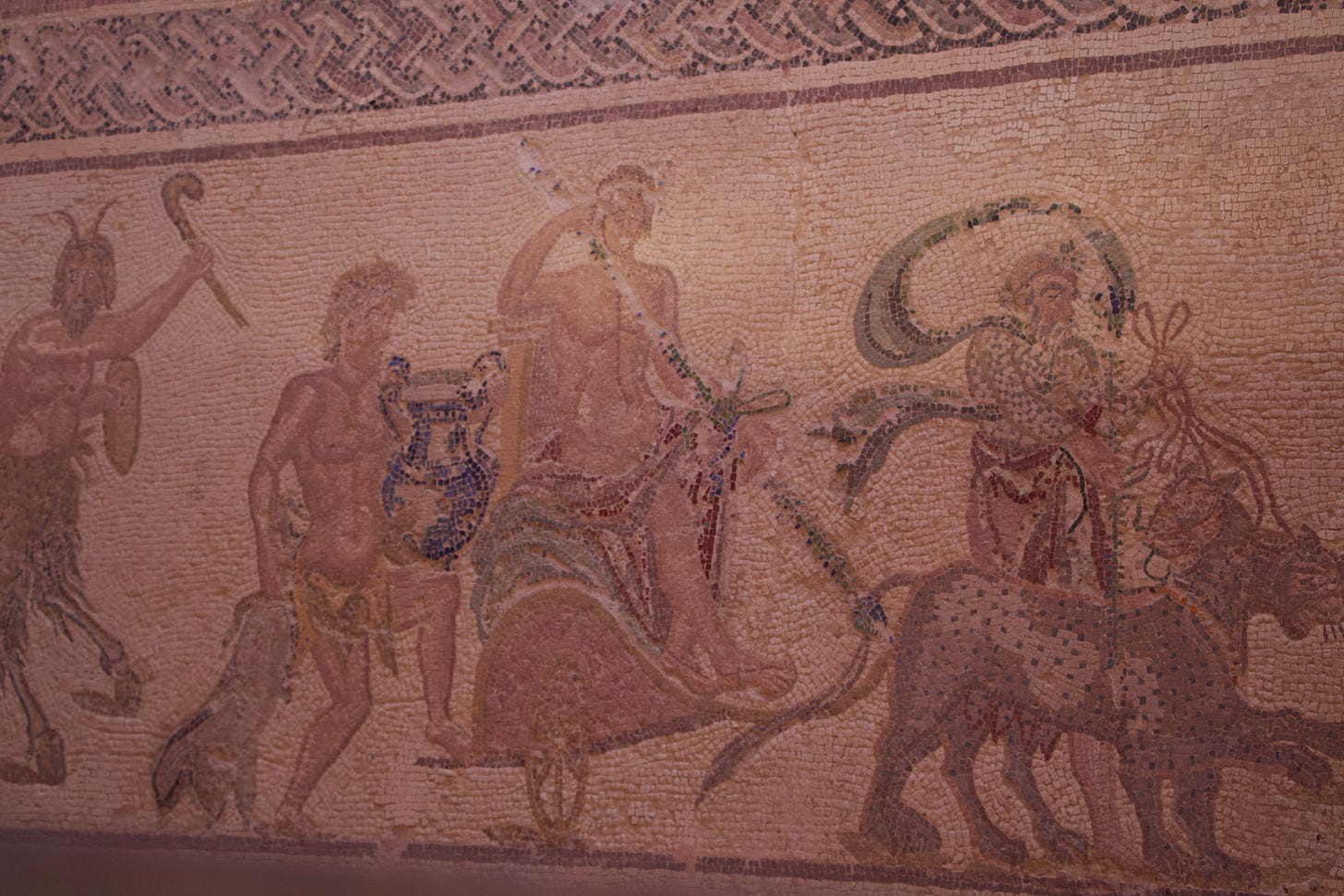A Study of Acts: The Missionaries Go to Cyprus and Meet a Magician
Acts 13:4-12 - Souls are at stake - can we be filled with the Holy Spirit like Paul so that the enemy is vanquished?
“So, being sent out by the Holy Spirit, they went down to Seleucia and from there they sailed to Cyprus. When they reached Salamis, they began to proclaim the word of God in the synagogues of the Jews; and they also had John as their helper. When they had gone through the whole island as far as Paphos, they found a magician, a Jewish false prophet whose name was Bar-Jesus, who was with the proconsul, Sergius Paulus, a man of intelligence. This man summoned Barnabas and Saul and sought to hear the word of God.
But Elymas the magician (for so his name is translated) was opposing them, seeking to turn the proconsul away from the faith. But Saul, who was also known as Paul, filled with the Holy Spirit, fixed his gaze on him, and said, “You who are full of all deceit and fraud, you son of the devil, you enemy of all righteousness, will you not cease to make crooked the straight ways of the Lord? Now, behold, the hand of the Lord is upon you, and you will be blind and not see the sun for a time.” And immediately a mist and a darkness fell upon him, and he went about seeking those who would lead him by the hand. Then the proconsul believed when he saw what had happened, being amazed at the teaching of the Lord.”
Acts 13:4-12 NASB1995
Being sent by the Holy Spirit, the group sailed to Cyprus to preach in the synagogues of the Jews first. So where did they go on this first leg of the first missionary journey? This map, from Precept Austin, shows the route:
Seleucia was probably the nearest seaport to Antioch. The island of Cyprus is not that far away (130 miles), so the first mission journey begins there. The Holy Spirit sends them out and they make a group decision to go to Cyprus. It isn’t known if they preached in Seleucia, but because it was so close to Antioch it would not be surprising if a congregation was located there. So if the Spirit is leading us what does that mean? I liked this commentary I found from Ray Stedman in Precept Austin:
They went to Cyprus, landed at Salamis, and began to preach. Obviously they expected God to be with them and to open doors everywhere they went. This is the way the Holy Spirit commonly operates. No one is to wait for orders covering everything he does.
There are many mistaken ideas abroad today as to how the Holy Spirit leads us. Young Christians often get the idea that they are to be like robots, automatons, ruled by computer-impulses which come from the Spirit. They think we are to sit and wait until we get one of those. I remember a young man at Dallas Seminary when I was a student there who thought that was the way the Spirit worked, so he would stop at the foot of a staircase and ask God to show him whether he should go up the right side, or the left. He would pray about whether to put his hat on in the morning, or not. If God ran our lives like that we would be nothing but mechanical beings. Animals are run like that by instincts, but not men.
God is not interested in such antics. He is interested in our understanding that he is to live within us. He will direct us precisely at times (and when he does, don't ignore it), but when he doesn't, move out where you are with the confident expectation that God is with you and will open the doors to make a way for you. [bold added by me]. When you follow that pattern, you are bound to find life exciting. God is very creative, and he is always doing something surprising, unexpected. You cannot improve upon the strategy of the Holy Spirit.
No one could anticipate the right way to approach these Cyprian cities, and plan out an attack in some systematic way, and expect it to succeed. This is the problem with the church in the twentieth century. We are forever calling conventions, councils, retreats, and conferences to try to decide where we ought to go next, to program it all, structure it, organize it, and move along carefully planned lines as though the whole thing depended on us. That is why the church is faltering, and failing, and has lost its note of excitement. The strategy belongs to the Holy Spirit. He is the only one that knows how to reach a city, or a country, or a nation -- how to proceed.
Yesterday, we had an interesting sermon at the church we are now attending. The context was from Judges concerning the reluctant man of God, Gideon. Gideon seemed to always have an excuse as to why he was not the right man to bring the nation of Israel back to obedience, belief and to overcome their enemies, but God takes Gideon one step at a time and uses him, even when he demonstrates fear and very little faith and he even tests God (wrongly, but God answers him). We are directed at precisely the right times, if we are listening. We are not robots, however, and when we step in the right direction, sometimes it is up to us to keep going forward with expectation.
The group preaches across the island until they finally reach Paphos, on the west coast. There they find a Jewish false prophet going by the name of Bar-Jesus (also called Elymas) who is with the proconsul Sergius Paulus. So what is a proconsul? According to some of the commentary, this was a representative of the Roman Senate. This little tidbit from A.T. Robertson on Precept Austin tells the backstory rather well and shows how Luke was cognizant of the political machinations in the area:
Luke used to be sharply criticized for applying this term to Sergius Paulus on the grounds that Cyprus was a province under the appointment of the emperor with the title of pro-praetor and not under the control of the senate with the title of proconsul. That was true [in] B.C. 30, but five years later it was changed to proconsul by Augustus and put under the control of the Senate. Two inscriptions have been found with the date A.D. 51 and 52 with the names of proconsuls of Cyprus and one is in the Cesnola Collection, an inscription found at Soli with the name of Paulus as Proconsul, undoubtedly this very man, though no date occurs.
Apparently, Paphos back in the time of Acts was yet another city rife with immorality. In 2018, we visited Cyprus on a cruise and docked in Limassol, which is on the southern side of the island just east of that peninsula you can see in the map above. We had a shore excursion that visited Paphos on the west side to see some exquisite Roman mosaics and also visited a beach area and more Roman ruins on our way back to Limassol. Here’s an example of one of those mosaics from our photo collection, showing the strange things that people would admire and actually include in an artwork as elaborate as a mosaic:
Mosaic near Paphos, Cyrus. Photo Copyright © 2018 Steven Sande
Sergius Paulus is described as intelligent and wants to hear the word of God. Elymas opposes the missionaries. Luke now makes a break with the name Saul and says in this passage that Saul is also called Paul (and he will be called by that name for the rest of Acts). I want to dwell on that word intelligent for a moment. This comes from the Greek adjective συνετός or synetó, meaning wise, learned or having understanding. Synonyms from the Greek include prudent, expert, having insight.
When I was wandering in my agnosticism, I called Christianity many things but never intelligent. I thought that Christian belief was stupid and primitive, the worst of all belief systems. How could those snake-handling rubes be so ignorant of science and the vast emptiness of the universe and our tiny existence that was randomly placed by indifferent chemical processes in that cold universe? I prided myself on my intelligence. But I had no understanding or wisdom! I was exceedingly imprudent. The Holy Spirit worked on me and worked on me to give me true insight; I was blind and then I truly saw. The light dawned and now I see that my insights are gifted by Him. Sergius Paulus was indeed intelligent and it is no coincidence that a Roman proconsul, with his authority and power, was destined to become a believer and these itinerant missionaries were meant to meet him.

Now back to the scene at hand. Paul confronts Elymas. The Gospel will always be opposed by the enemy; you could say that I aided and abetted the enemy when I was wandering in the wilderness. Paul, filled with the Holy Spirit, tells Elymas that he is full of deceit and fraud, he is the son of the devil, the enemy of righteousness, he is making crooked the straight path of the Lord. Like the path in the photo above, Elymas is trying to lead the proconsul into more darkness. Paul tells Elymas that the hand of God is on him and he will be blind and not see the sun for a long time (a “season” in some translations) and, indeed, Elymas was blinded. Sergius Paulus sees and believes and was amazed at the teaching of the Lord. This commentary is quite good from Enduring Word:
Filled with the Holy Spirit… Said, “O full of all deceit and all fraud”: Paul, using spiritual discernment and operating in the gift of faith, rebuked and pronounced the judgment of God upon Elymas (you shall be blind).
As Elymas was struck with blindness, we can’t help but think Paul would remember his own experience with God. Paul was struck blind at his conversion on the road to Damascus (Acts 9:9). Certainly, those who resist God are blind spiritually, so God just gave Elymas a physical blindness that matched his spiritual blindness. Sadly, we never hear of Elymas repenting, as Paul did.
Then the proconsul believed: Paul was harsh in his confrontation against Elymas because the eternal destiny of the proconsul was at stake.
If one wants to commit spiritual suicide, that’s one thing. But it is never right to bring others down also. If you want to give up on the things of God and grow bitter in your heart against Him, that’s your choice. But it is a heavy sin to draw anyone else away with you, either with your words or your example.
“The severest words of the Bible, Old and New Testaments, are reserved for those who stand between men and truth, for those who stand between men and God…It must be the heart that loves Sergius Paulus that speaks in anger to Elymas the sorcerer.” (G. Campbell Morgan)
When he saw what had been done: Among other things, we can say that the proconsul saw something in Paul and something in Elymas.
He saw the courage of Paul. Here was a man of conviction, bold in his belief, and willing to make a stand for what he believed.
He saw the just result of Elymas’ sin, physical blindness corresponding to his spiritual blindness. When we see the trouble sin brings people into, it helps us pursue God more earnestly.
Being astonished at the teaching of the Lord: As amazing as the miracle of Elymas’ sudden blindness was, the good news the proconsul heard from Paul was even more amazing. His astonishment is said to be at the teaching of the Lord (presumably, the doctrines of God’s gracious gift to man in Jesus, through the cross) not the miraculous work before his eyes.
An interesting observation is that Paul experienced his own temporary blindness and now, through the Holy Spirit, blinds Elymas. Paul repented but there is no evidence that Elymas saw the light. This story reminds me of the tale of King Theoden of Rohan in “Lord of the Rings”. Theoden was under the spell of an evil agent named Wormtongue; Gandalf banishes Wormtongue back to his evil overlord Saruman and Theoden recovers and believes in righteousness and good again.
Sadly, for those years I was away from God, I was trying to convince others of my “truth”. I reserved wrath for believers and used ridicule and mockery as tools of destruction. May the Lord forgive me! I see this same dynamic at work every day in the world of social media. Someone with a lot of followers will post a Bible verse or an excerpt from a sermon and the non-believers come out of the woodwork to mock, spew hatred and try to get the last word. The spirit of Elymas and the enemy is everywhere. How many souls are being lost every day because they are uncertain of what they believe and they latch onto the “strongest horse” in an argument who also happens to an antichrist? We must sow the Word and do it in an intelligent way that brings light to others.
My next devotional examines Acts 13:13-25 - The group, without John Mark, travels back to Asia Minor and the first part of Paul’s first sermon is recorded.
Heaven on Wheels Daily Prayer:
Dear Lord - I am grateful beyond words that You have forgiven me for my doubts and apostasy. Please help me to be a source of Your light and Word to others and realize, every day, that souls are at stake. Amen.
Scripture quotations taken from the (NASB®) New American Standard Bible®, Copyright © 1960, 1971, 1977, 1995 by The Lockman Foundation. Used by permission. All rights reserved. lockman.org
Precept Austin was accessed on 10/28/2024 and 10/29/2024 to review maps and commentaries for Acts 13:4-12.
The Blue Letter Bible was accessed on 10/29/2024 to review the lexicon for the word “Intelligence”.
Commentary from Enduring Word by David Guzik is used with written permission.





